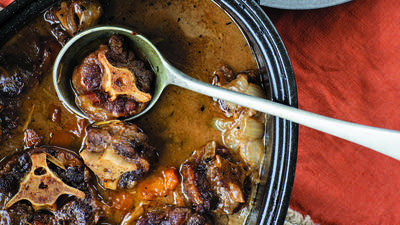
In the beginning, there was beer -- the all-American, all the same beer. Then came the microbrews or craft beers -- all different, and as prolific as Starbucks. So now, is the next big moment the snifter beer?
To answer that, we talked to Andy Crouch. Craft beer is his beat. He's written Great American Craft Beers, A Guide to the Nations Finest Beers and Breweries.
Lynne Rossetto Kasper: I've noticed that there are these unbelievably high alcohol beers, like 40 percent. Is this the next big deal in beer?
Andy Crouch: In the last 5 years or so, we've really seen this sort of explosion in flavor and something in the beer world that's been called extreme brewing. It has really pushed the envelope and helped to define what the parameters of beer are. We once thought of beer as sort of this yellow, cold, fizzy substance. And now we have beers that taste, smell, and act exactly like fine cognac. It is definitely a very interesting trend. We're starting to see quite a few breweries from around the world taking part in this alcohol arms race.
LRK: Why are they going after this? It seems like an odd direction for beer to take. The finesse of beer, to me, was always to bring out flavor or bring out a particular character -- an ingredient -- not just go for that high alcohol.
AC: And I think that's definitely true. Balance remains important, but I think a number of brewers have really developed a lot of flavors with hops, barley malt and yeast. This is just the next frontier for them in terms of checking out flavor; it's not just about trying to build something akin to grain alcohol.
I think they're headed more in the area of trying to be single-malt scotch. There can really be a lot of alcohol there, but they can really make high-quality beverages that begin to test the limits of what beer can be. And to try new flavors.
LRK: Can you age these beers?
AC: They can be aged. And in my book, this is something I encourage people to try at home. Beer is such a reasonably priced beverage that, when you age them (especially ones that have higher alcohol, above 8 or 10 percent), they can take on different flavors. The hops drop out a little bit, it gets a little bit less bitter, and what you have left behind are these really rich, caramel, toasted flavors that can develop into a whole range of different things. You can see them going more toward toffee and sweetness, and a little bit more toward fruit.
LRK: So, is there a flip side to this?
AC: There is. There are a number of brewers who look at this alcohol arms race and say, "That's not for me. We want to go in the opposite direction." And that is what has been traditionally been called "session beer." It refers to beers that are under 5 percent alcohol -- and preferably those under 4 percent. There are beers that mine fantastic flavors and do it in a way such that you can have a conversation with you friends over a couple of hours and a couple of pints and not be a real mess at the end of it all.
Most beers we drink are about 5 to 5 1/2 percent alcohol. When you knock off a couple of ounces, people don't think that makes a big difference. But when it's two, three, four pints over the course of a few hours, it makes a big deal.
LRK: So what about the taste of these sessions beers?
AC: They can be fantastic. Sometimes people consider lower-alcohol beers to be inferior in terms of quality or flavor, but that's just not the case. It takes real craft and real artisan brewers to be able to bring out flavor without having to rely on the crutch of alcohol. I think it's a real challenge and not a lot of brewers do it as well as people who love session beer would hope that they would.
Session beers can be almost any style. They can be deep-roasted, chocolatey stouts. Or they can be really bright, lively, fruity ales.
LRK: Interesting. I can actually step up to the bar and say, "I'll have a session beer."
AC: Yes, and I think that's starting to become more of a thing -- people wanting to see alcohol levels on menus. They want to know what they're getting into, because with beer expanding its parameters, who knows. Maybe you're ordering an 8 or 9 or 10 percent triple or something like that.
Before you go...
Each week, The Splendid Table brings you stories that expand your world view, inspire you to try something new and show how food brings us together. We rely on you to do this. And, when you donate, you'll become a member of The Splendid Table Co-op. It's a community of like-minded individuals who love good food, good conversation and kitchen companionship. Splendid Table Co-op members will get exclusive content each month and have special opportunities for connecting with The Splendid Table team.
Donate today for as little as $5.00 a month. Your gift only takes a few minutes and has a lasting impact on The Splendid Table and you'll be welcomed into The Splendid Table Co-op.




